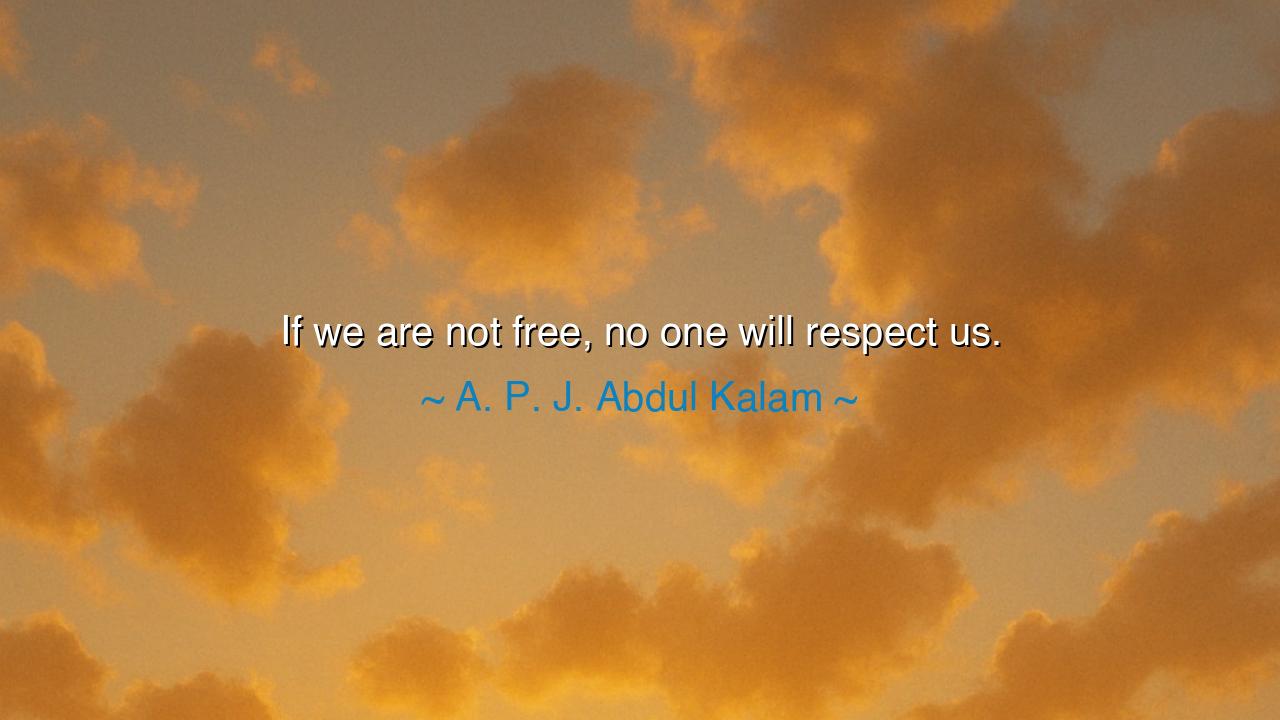
If we are not free, no one will respect us.






The words of A. P. J. Abdul Kalam — "If we are not free, no one will respect us." — resound like a clarion call across the centuries, a reminder that dignity and honor are bound inextricably to freedom. To live without freedom is to live in chains, whether those chains are forged of iron or of fear. And a people in chains, however polite the world may seem toward them, are denied true respect. For respect cannot be given to the enslaved; it belongs only to those who stand upright, with their destiny in their own hands.
Kalam, the "People’s President" of India, spoke these words from the crucible of his nation’s history. India bore the yoke of colonial rule for generations, its people subjugated and its spirit suppressed. Though the land was rich and its people capable, the absence of freedom stripped them of the world’s recognition. It was only through struggle, sacrifice, and the eventual reclaiming of independence that India earned not only liberty but also the respect of nations. Thus, the origin of Kalam’s words is both historical and moral: the world bows not to the enslaved, but to the free.
History bears witness to this truth again and again. Consider the fate of Sparta and Athens in the ancient world. The Greeks, though small in number, stood against the mighty Persian Empire. Why? Because they valued freedom above survival. At Thermopylae, Leonidas and his three hundred fought to the death, not because they sought the admiration of others, but because they refused to live as slaves. And yet, by their courage, they earned the respect of the world, so much so that their story still stirs the hearts of men two thousand years later.
Or look to Nelson Mandela, who endured twenty-seven years of imprisonment in South Africa. He could have chosen silence and safety under the rule of apartheid, but instead he chose the long road of struggle. When he and his people emerged free, they did not merely win back their nation — they won the respect of the world. For no matter how polite the oppressor’s words, there is no true honor without liberty. Mandela’s freedom restored dignity not only to himself, but to his people.
The wisdom of Kalam’s words is therefore this: freedom and respect walk hand in hand. A nation that surrenders its independence may be pitied or tolerated, but it will never be revered. A person who allows others to dictate his values or choices may be liked, but never deeply respected. Only those who guard their freedom — freedom of thought, freedom of conscience, freedom of action — can command the reverence of others.
The lesson is clear: if you would be respected, you must first be free. Free from domination, free from corruption, free from the fear that makes you betray your conscience. This is as true for individuals as it is for nations. Your dignity begins when you refuse to live in the shadow of another’s will, when you claim your own destiny, no matter the cost.
What, then, should you do? Defend your freedom fiercely. Do not barter it for comfort, nor surrender it for approval. Guard the independence of your mind — think your own thoughts, question what is false, hold fast to what is true. Stand for the liberty of your people, for when they are free, they are respected; when they are enslaved, they are ignored. And remember: freedom is not given once for all; it must be protected daily, in choices both great and small.
Thus let this teaching be carried forward: without freedom, there is no respect, and without respect, there is no true life. Be vigilant, therefore, as guardians of liberty. For in freedom lies not only honor, but the very key to being recognized as human, worthy, and unbowed before the eyes of the world.






AAdministratorAdministrator
Welcome, honored guests. Please leave a comment, we will respond soon